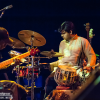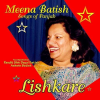Ashwin Batish is an extraordinary sitarist and tabla player. He received training in the North Indian classical tradition from his father S.D. Batish and later created his own unique fusion of Indian classical sitar with pop, rock, jazz, calypso, funk... an example of a few hybrids he excels at. He is famous for such songs as the Bombay Boogie, Raga Rock, Raga Jazz, Casbah Shuffle and Sitar Mania. His pioneering efforts in world beat music have earned him critical reviews and great respect in the music community.
Ashwin is also very well know for being an educator. His series of instructional videos for the sitar, tabla, dilruba, dholak, vichitra veena, harmonium that he has produced with his father Pandit Shiv Dayal Batish have become a very sought after commodity by the Indian music student. Ashwin often gives private and group Indian music lessons at his Santa Cruz, California USA facility and is often called upon by various music festivals and universities to perform his sitar and be a guest lecturer for weekend workshops and seminars on Indian music and ethnopop, raga rock sitar fusion.
"Whether or not you’re familiar with the music, your mind is likely to be delightfully blown by what Batish creates." SF Weekly, California "This fusion is out of this world and ready to be heard everywhere. .... They were like waves of music crashing, one Indian, one Western and then both together. It was breathtaking." Brad Kava - Patch April, 2012 “You could call it sambas, or Afro-Cuban, but it's beat music—with exotic, more cultural melodies on top,” says Batish, who describes the blend as “World Beat.” “You gotta get up and dance,” he says
Read more
"Whether or not you’re familiar with the music, your mind is likely to be delightfully blown by what Batish creates." SF Weekly, California "This fusion is out of this world and ready to be heard everywhere. .... They were like waves of music crashing, one Indian, one Western and then both together. It was breathtaking." Brad Kava - Patch April, 2012 “You could call it sambas, or Afro-Cuban, but it's beat music—with exotic, more cultural melodies on top,” says Batish, who describes the blend as “World Beat.” “You gotta get up and dance,” he says. “I think we don't, as a society, make it convenient enough for people to relax. With music we find an opportunity to escape … I can take my music and relax somebody, or put a smile on their face; they actually break out of their shell and share. They take a journey with me.” TREVOR STONEHOUSE - Good Times Santa Cruz "Ashwin Batish has broken out of the classical Indian music mold into an electronic and electrifying style that is modern in every sense, but does not lose the melodic and often mysterious sound of India. In his way, he is making Indian music more accessible to the Western listener, bringing this music to the ears of people who otherwise would not make the effort to listen to more traditional players, such as Ravi Shankar or Ali Akbar Khan. He is bringing great music to all of us." Mary McCaslin - Santa Cruz Sentinel "His trademark “sitar power”–which appears on the cap that he usually sports–was coined during this period. There is a strongly spiritual and even a metaphysical quality to the way he describes music. “You are by your very nature tuned like an instrument,” said Ashwin, “That is why music is so beautiful . . . With my sitar, if I play the top notes the bottom notes vibrate–it is called sympathetic vibration. In the same way, your body has sympathetic nerves that are already in you so that when you hear music they sympathize and this is how you can react . . . There is no theory behind why we do it; it is just in us. It is one of the laws of nature I would say . . . Literally we are all vibrations, so that is why a bunch of notes that are attractive to you are actually a part of you . . . You are a part of it and it is a part of you." Sarah Lin Bhatia, California Diaspora
Show less
band / ensemble / orchestra
















